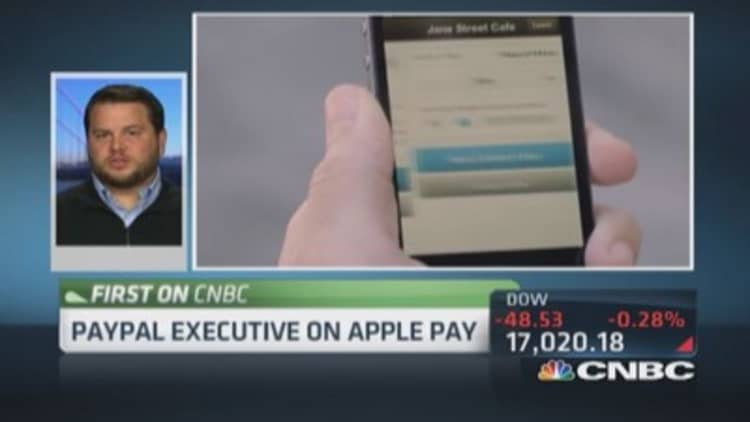
Apple faces a mountain of challenges as it seeks to break into mobile payments with Apple Pay, a PayPal executive told CNBC on Thursday.
"Payments is a tough ecosystem and you know, other players, other major consumer Internet companies have tried to enter in the space and have found, you know, limited success," said Bill Ready, CEO of Braintree, the company owned by mobile payment service providers PayPal and owns Venmo. "And a big part of that is it is a very difficult space."
What's interesting about Apple Pay, though, is that it only addresses the front-end of the payment process, Ready said. In other words, Apple Pay seeks to eliminate the plastic card, only to leave the rest of the mobile payments process up to the existing ecosystem, he said on "Squawk Alley."
Still, retailers will likely have questions about things like security and fraud, two of the industry's biggest challenges, Ready said.
"It's quite noteworthy that, you know, you had many of the largest retailers, most of the largest retailers, including Wal-Mart and Best Buy and others not part of the announcement," he said. "And I think these are some of the questions that they'll need to have answers, like those tough parts of payments: Who's going to be responsible for the fraud when fraud happens?"
An Apple spokesperson declined to comment.
However, Apple's retail partners announced on Tuesday included Apple stores, Disney; Macy's and its subsidiary Bloomingdale's; McDonald's; Panera Bread; Staples; Sephora, Subway; Target; Walgreen; and Whole Foods. OpenTable and Groupon customers will be able to use Apple Pay to make app purchases, and the service will also become an option for charging the Starbucks card on the store's existing app.
Still, Ready noted another challenge is "this chicken-and-egg problem," where Apple needs both consumers and merchants to adopt mobile payments at the same time.
"On the consumer side, there's this question of what's the value proposition? I don't know that consumers are screaming out, saying 'I don't want to swipe anymore.' It's one of the easiest things a consumer does," he said. "Having to rewire hardware terminals is very expensive ... there's not a clear value proposition for the merchant either."
—By CNBC's Drew Sandholm


